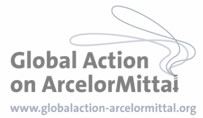Steel giant ArcelorMittal

Despite ArcelorMittal's penchant for profit over people international financial institutions (IFIs) continue to disburse loans to the company.
Does ArcelorMittal really need public loans?
During the last 15 years, ArcelorMittal’s predecessor companies, mainly Mittal Steel, have bought up several old and highly polluting steelmills and made them profitable. However environmental improvements other than those necessary to increase production efficiency have been painfully slow.
ArcelorMittal among worst lobbyists
As in the previous year, ArcelorMittal was again one of the candidates for the 2010 worst EU lobby award.
While the company is one of Europe's largest emitters of CO2, it successfully lobbied the European Commission on behalf of Europe's biggest polluters to continue getting free greenhouse gas emissions permits until at least 2020.
The company has benefited from eleven IFI loans during the last ten years (details below). Yet its net profit in 2007 (the year the EBRD approved the Kazakh loan) was USD 7.6 billion. [1]
ArcelorMittal’s CEO and President of the Board of Directors, Lakshmi Mittal, who owns 40 per cent of the company, is the 5th richest man in the world and the richest resident of the UK, worth USD 28.7 billion.
Is this the type of beneficiary that the architects of low-interest development loans had in mind when they set up the IFIs?
Evidence from the ground
|
Temirtau, Kazakhstan The company claims to have implemented the environmental and health and safety improvements for which it received IFI loans at its Temirtau mining complex. But many accidents and deaths are still happening in the mines and ArcelorMittal is reluctant to disclose documents and proof about the alleged improvements. |
Kryvyi Rih, Ukraine The ArcelorMittal Kryvyi Rih (AMKR) is an enormous steel mill in South Ukraine. A loan from the European Bank for Reconstruction and Development (EBRD) in 2006 helped to increase productivity and expand the company's market position, but failed in reducing the pollution caused by the steel mill. |
Also on our website:
Video testimonies and more materials from a fact-finding mission to ArcelorMittal's mining operations in Kazakhstan.
Civil society reacts: Global Action on ArcelorMittal

In 2008 the Global Action on ArcelorMittal coalition was formed by community and environmental groups from various countries where ArcelorMittal operates its steel mills and mines. The coalition’s aim is to hold the world’s largest steel company accountable for the social and environmental impacts caused by its activities.
The coalition has exposed problems in countries as diverse as the Czech Republic, USA, Liberia and South Africa, and has called on the international financial institutions not to condone ArcelorMittal’s activities with any more public money.
1. ArcelorMittal annual report 2007 (pdf)
2. IFI loans to ArcelorMittal during the last ten years:

Read more
Details on the shortcomings of different ArcelorMittal project’s can be found in our studies on the company's local impacts:
ArcelorMittal: Going nowhere slowly (2008-09)





